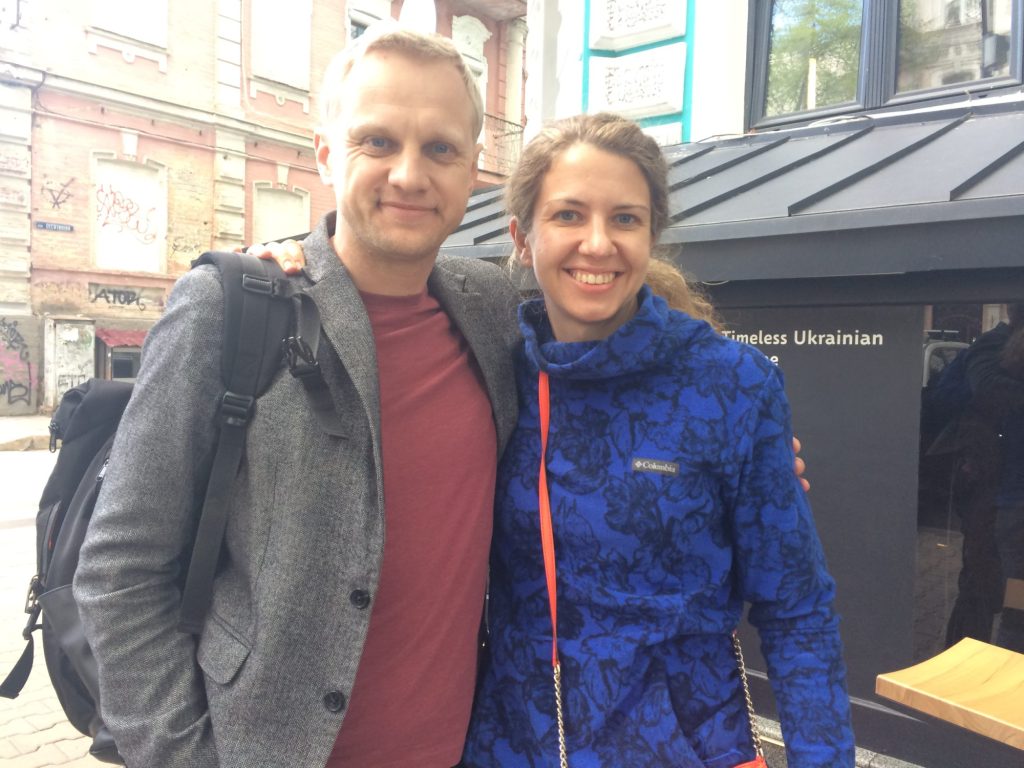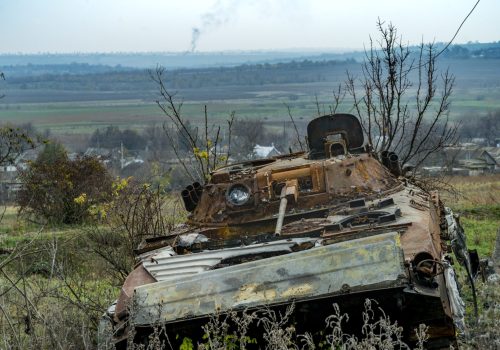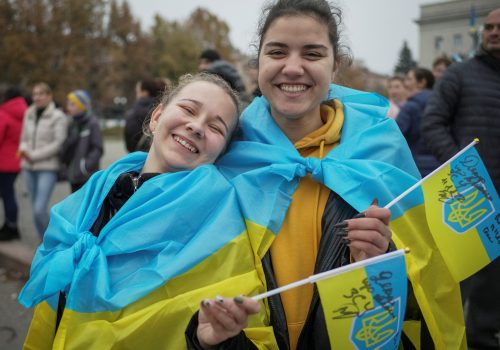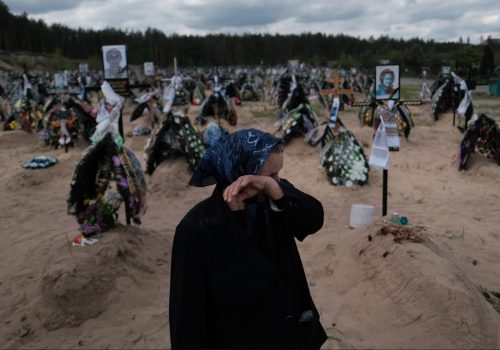“Does she ever write about anything other than Ukraine?” my sister-in-law secretly asked my husband. “It’s so obscure.”
Nope, and for good reason.
As I prepare to leave the Atlantic Council and join the Superhumans Center, a Ukrainian charity that will build the first prosthetics hospital in Ukraine, I owe hundreds of people money, dinner, and mostly eternal gratitude. Thousands more have trusted me with their secrets and stories. I hope I didn’t screw them up too much.
To those who have made the last eight years awesome, thank you.
Yevhen Hlibovytsky, my tutor, driver, fellow nosy social scientist, and beloved friend, your spirit infuses my work and love of country. I can’t wait to show you the eccentric parts of America. There are a lot of them! Duzhe, duzhe dyakuyu.
When I became the editor of UkraineAlert in 2015 I was woefully under-qualified. Dr. Alina Polyakova convinced John Herbst to hire me over a more pedigreed man. Peter Dickinson, Christian Caryl, Uri Friedman, Amanda Abrams, and Larry Luxner, you reshaped my underdeveloped stories and encouraged me countless times.
My co-conspirator, editor, and debating partner Jacob Heilbrunn makes every piece 1000 times better, but please do not tell him. And while we are on that subject, please don’t tell John Herbst that I didn’t write any of the titles that gave the communications team heartburn. That was my brilliant husband. Thank you, Daniel!
Ambassador John Herbst, you are the Atlantic Council to me. You made the fight fun, the debate delicious, and every conversation convivial, and you made me a better person. I will be in your debt until they bury me in Kyiv.
Stay updated
As the world watches the Russian invasion of Ukraine unfold, UkraineAlert delivers the best Atlantic Council expert insight and analysis on Ukraine twice a week directly to your inbox.
Before I sally forth, I relish the chance to explain why Ukraine has captivated me for more than fifteen years.
It was not love at first sight. In 2006, I went to Ukraine as part of a disastrously organized election observation mission. I found Kyiv forbidding but was quickly put on a train to Crimea to observe in Simferopol, an ugly but otherwise unremarkable post-Soviet city. The leaders of our election team soon vanished and we were left with two older gentlemen from the Canadian diaspora, who graciously volunteered to hastily assemble maps and organize our mission.
I took the work seriously and I almost got into a fistfight as a result. When I saw violations, I duly noted them. At one polling station, a large man was voting outside of the ballot box. Voters have a right to privacy, and in a place like Crimea that overwhelmingly votes for one party, privacy is key.
As a diligent election observer, I took a picture of the man. He came at me demanding to know what I was doing. A crowd quickly gathered as the situation escalated. I insisted I had the right to take photographs and note violations. The head of the precinct, with the unnatural burgundy hair you only see in the former Soviet Union, called Kyiv for guidance. “Unfortunately, this young woman has the right to take pictures,” she announced with a scowl. The crowd heaved a disappointed sigh and dispersed. As we exited the polling station, I was shaken and scared the big man might be waiting for me. What a country.
I never intended to come back. At the time, I had landed a dream job at Freedom House. I was giving Saudi Arabia hell for its gross and innumerable human rights violations, but my boss was impossible and the task felt hopeless. I feared it would take Saudi Arabia decades to change.
Fast forward. My boyfriend at the time landed a Fulbright scholarship to Kyiv and was having the time of his life. I was miserable and decided to join him. I soon found a job in Ukraine teaching English. The initial Skype interview went swimmingly and the Ukrainian trainer was both charismatic and lovely. At first, I only intended to stay for six months and then enter boring middle-aged American life. Instead, I found my calling and have never looked back.
Eurasia Center events

Sergiy Gusovsky, one of Kyiv’s most beloved restaurateurs and among the finest people you could wish to meet, often remarks that once a Westerner falls for Ukraine, they are hooked for life. That’s exactly what happened to me.
In January 2007, I made the big move to Ukraine. It was beyond cold. Even with my ankle-length wool coat and eighteen Alaskan winters under my belt, I could barely take it.
The American English Center rented space in ordinary schools. I taught mostly college students daily from 4pm to 10pm. The beginner students couldn’t understand a word I said, but the advanced students got me and were soon demanding harder and harder words. Hour after hour, we talked about Ukraine’s social structures, the economy, the country’s endlessly frustrating politics, its painful history, and society’s ridiculous expectations of women. There was no subject that was off limits.
Within six months, I had decided I never wanted to leave. Kyiv is the world’s most underrated city. Not only is it extraordinarily beautiful, especially during the spring months, but the spontaneous and generous nature of everyday life also appealed to me. The Kyivite focus on the here and now is the inverse of Max Weber’s Protestant ethic which I had imbibed far too deeply by age 18. Being in the Ukrainian capital helped me rediscover by natural equilibrium.
Plus, it was dirt cheap. My $400 per month apartment overlooking the golden domes of Pechersk Lavra Monastery was a sensational place to live. Meanwhile, Kyiv’s location at the center of Europe enabled me to visit 10 countries in six months. Leaving wasn’t an option.
Although I did eventually move back to the US, I never really left. Ukraine has remained with me. For the past eight years, I have been privileged to lead and build the biggest, loudest, and most effective program on Ukraine in North America at the Atlantic Council together with Ambassador John Herbst.
I often find myself answering the same peculiar question: “Why are you, a girl with a German surname and no discernible connection to Eastern Europe, so taken with Ukraine?”
Normally I give a canned answer. I grew up in Kenai, a small village in Alaska with a Russian Orthodox Church. When I was in the sixth grade, the Berlin Wall fell and Russians poured into Alaska. Regional flights were set up between the Russian Far East and Alaska, and the local business community got very excited about linking the two frontier lands. Closer to home, Miss Tatiana appeared in my school and I began studying Russian. I became mesmerized by the language and by the sight of golden samovars.
Recently I’ve realized that the true answer to this question is actually deeper. Much deeper.
Ukraine’s unquenchable thirst for freedom and justice inspires me endlessly. Even when the picture there looks hopeless, which it often does, my courageous warrior friend Vitaliy Shabunin reminds me to take the long view. “There are thousands of people like me. We are going to change Ukraine. It’s only a matter of time,” he says. May it be so, Vitaliy, and may it be so soon!
Thank you for your love, your trust, and your support over the last eight years! Все буде Україна!
Melinda Haring is the deputy director of the Atlantic Council’s Eurasia Center. She tweets @melindaharing.
Further reading
The views expressed in UkraineAlert are solely those of the authors and do not necessarily reflect the views of the Atlantic Council, its staff, or its supporters.

The Eurasia Center’s mission is to enhance transatlantic cooperation in promoting stability, democratic values and prosperity in Eurasia, from Eastern Europe and Turkey in the West to the Caucasus, Russia and Central Asia in the East.
Follow us on social media
and support our work
Image: Melinda Haring pictured in Kyiv with Ukrainian reformer Vitaliy Shabunin (Courtesy Photo)




